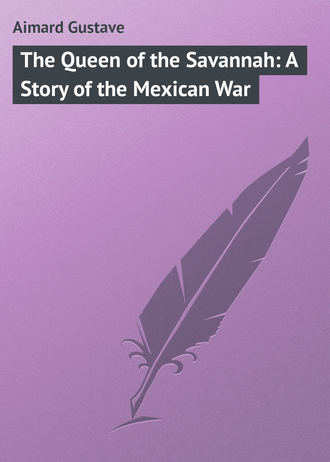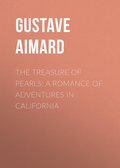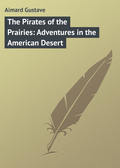
Gustave Aimard
The Queen of the Savannah: A Story of the Mexican War
The Stag understood of what importance the capture of Don Melchior was to him. The consequences of his flight might be immense, and make him lose the fruits of the bold stroke he had attempted; hence, without reflecting further, he rushed in pursuit of him. After a considerable loss of time and unheard of efforts, he at length reached the bottom of the precipice. He then began seeking for his enemy with the tenacity and skill of a wild beast, not leaving a single bush uninspected.
But all was in vain; he found no trace of Don Melchior. The Indian had one hope; it was that the Mexican, dragged down by the rapidity of his descent, had rolled into the deep, though narrow stream, which ran through the bottom of the quebrada, and had been drowned, ere he sufficiently regained his senses and strength to avoid this mortal fall. But if nothing contradicted this hope, nothing, on the other hand, corroborated it, and the Comanche chief was constrained to quit the spot, suffering from a doubt a thousand times more terrible than the most frightful certainty. After exploring the canyon for some time with that wild beast's instinct which redskins possess so thoroughly, the chief succeeded in discovering a narrow path made by antelopes, which wound round the sides of the precipice. He hastily ascended it, feeling anxious about what had occurred among his warriors during his absence.
Let us now return to Doña Emilia and her daughter, whom we left in an extremely critical situation. The two ladies had been hurled to the ground in such a way that it was impossible for them to rise without assistance. Their horses had been scarce shot ere the fight, which appeared so obstinate between the white men and redskins, suddenly ceased as if by enchantment, and friends and foes on the best possible terms approached the two prisoners, for they may be regarded as such. The first Indians who arrived near enough to Doña Emilia to recognize her features, stopped in horror and fell back a few paces, saying to their comrades, "The Queen of the Savannah! It is the Queen of the Savannah!"
A very decided retrograde movement then began among the Indians; they stopped and formed a wide circle about twenty yards from the two ladies; it was probable that not one of them was anxious to venture within reach of a woman whom all regarded as the evil genius of their nation. The white men, or at least those who wore that dress, were alone bold enough to approach her, which they did not do, however, without very marked hesitation.
At last, after exchanging a few words in a low voice, two of the bravest of them ventured to assist the unhappy ladies, while the others, who stopped a few yards off, kept their finger on the trigger, ready to fire at the slightest suspicious movement on the part of the prisoners. But they had nothing to fear from them; their fall had crushed them; they were nearly fainting, and could scarce keep up.
"If you are Christians," Doña Emilia murmured, in a faint voice, "help my daughter, my poor child; she is dying."
They made no reply, but after raising the two ladies with a species of sorrowful pity, they transported them to the top of the hill, and laid them on furs near a fire, which the Indians had lit while they were being brought up. Doña Diana then noticed that the horses lying on the ground, behind which the defenders of the mound had sheltered themselves, were not killed, as her mother had supposed, but merely bound so that they could not stir.
"Oh, my presentiments!" she murmured feebly, as she raised her eyes to heaven.
And she fainted, succumbing as much to the grief that filled her heart, as to the physical suffering she experienced.
CHAPTER XXIV.
OLIVER CLARY
As we have seen, Running Water and his comrades attacked Count de Melgosa after White Crow had summoned him to surrender. The unexpected arrival of Doña Emilia had not only foiled the plans of the Comanche chiefs, but also caused such a panic among their warriors that, in spite of the efforts of the sachems to rally them, they were even really themselves carried off and constrained to seek safety in a hurried flight. In a retreat so precipitate as that effected by the redskins, the feeling of terror so rules over all other feelings, that the voice of the chiefs are despised, their orders are unlistened to, and each man running off at a venture, seeks his own safety without troubling himself about the rest. After a mad ride through bush and briar, and not following any settled direction, Running Water, who was involuntarily affected by the general terror, stopped, quite out of breath, and fell at the foot of a Peru tree, which rose alone in the centre of a spacious plain.
The night was still dark and a leaden silence brooded over the desert. The chief, far as his eye could see, did not notice one of his comrades; he was alone, and, as he conjectured from the perfect tranquillity and calmness that reigned around him, in safety for the present. Then he began reflecting; his thoughts were sad, for nothing settled at the council had been carried out; the count had escaped, and the warriors were dispersed, so that it was useless to attempt to rally them in order to give the young chief, his son, the support which the latter had asked for. The sachem was greatly embarrassed, not through the position in which he found himself – alone, without support, and almost unarmed – a position which to any other than an Indian accustomed to desert life would have appeared extremely precarious, the more so because the sachem had ridden far into the Mexican territory, and was consequently a long way from his village; but Running Water did not think of that. What tortured his mind was the insult offered to his indomitable pride in the disgraceful flight of his comrades at the mere sight of a woman, and the honour of himself and the tribe compromised in an expedition which had cost the lives of several men without producing any advantage.
The sachem had been plunged in these gloomy thoughts for a long time, when he fancied that he could hear a slight sound near him. The Indian raised his head, stifled a cry of surprise, and with one bound was on his feet, knife in hand – this was the only weapon he had retained. While he had been yielding to his bitter thoughts, several Spanish lanceros, taking advantage of the darkness, had dismounted and completely surrounded him; this surprise had been executed with such skill and so silently, that the Indian did not perceive the presence of his enemies till it was not possible for him to avoid them. Upon the movement he made, the barrels of nearly fifty carbines were pointed at the sachem.
"Come, surrender, demon!" a rough voice said to him, "Unless you prefer being killed like the accursed dog you are."
Without replying, the sachem looked at the Spaniards who surrounded him; perceiving that any resistance would be useless, he let his knife drop at his feet, folded his arms on his chest, and waited.
"Bind him securely, but do not injure him," the voice already heard said. "Put him on a horse, and let us start."
This order was carried out in less time than it has taken us to write it. When the sachem was brought up, the Spanish officer examined him attentively.
"Why!" he said, "Heaven pardon me my mistake, I believed that I had only to do with a marauder; but the capture is more important than I fancied. This dog is no less than an Indian brave, and a chief into the bargain, as is clearly indicated by the feather he wears so proudly over his right ear. Would these demons dare to cross our border?"
We must do the Spanish government the justice of stating that, at the period of its domination, the Indian border was thoroughly guarded by posts established at regular distances, by presidios with strong garrisons composed of veteran troops, and by patrols which traversed the country day and night, watching over the common safety, and vigorously repulsing any attempt at plunder on the part of the Indians. Hence those incursions and invasions of the redskins which now devastate this unhappy country did not occur at that time. The Indians instead of attacking, had quite enough to do in defending themselves, for the Spanish policy tended continually to drive them back further into their impenetrable deserts.
At the present day all this has changed. The Indians have become conquerors in their turn, and, profiting by the intestine wars which constantly rend the old Spanish colonies, they have leapt over the border marked out for them, and have advanced so far into the interior of the civilized country, that they are encamped before towns and villages which were formerly prosperous but are now in ruins. Mines worked long ago by the Spaniards have again become the property of the Indians, and they have carried so far their contempt of the Mexicans, whose cowardice, by the by, is proverbial among them, that the Comanches and Apaches disdaining to take unnecessary precautions in invading the territory of their foes, have fallen into the habit of making their incursions at a regular period of the year, which they call the "Mexican moon." Even more incredible than the impudent boldness with which these expeditions are carried out, is the stupid patience and cowardly resignation of the white men, whose houses are burnt, crops destroyed, and cattle carried off annually, but who, so soon as the Indians have retired, begin building and sowing again just as if nothing had occurred, although they are perfectly well aware that their labour will be lost, and that the Indians will return to destroy it all at a given day and hour. It was one of the patrols to which we have referred that surprised and seized the sachem.
"Who are you?" the officer asked. "To what tribe do you belong?"
Running Water gave him an ironical glance, shrugged his shoulders contemptuously, but made no answer.
"Very well, as you please, my fine fellow," the officer, an old soldier accustomed to Indian warfare, answered mockingly. "We know how to loosen the tongues of men like you. Come, my men, mount, and let us be off."
The patrol resumed its march, and shortly before sunrise reached Leona Vicario. The sachem was immediately taken to prison, the general putting off his interrogation till after the festivities, which at this moment interrupted the course of justice. Accident, a few hours later, led the brave Canadian hunter to the same dungeon, as we have seen. We have described what took place between them above. After the flight of his comrade, the adventurer coolly remained in prison, to the great amazement of his keepers, who could not understand how a man could remain a prisoner of his own choice, when he had a chance of escaping.
The adventurer, without seeming to notice the sarcasms the Spaniards levelled at him, settled as comfortably as he could in a corner of his cell, and, placing his weapons within reach, in the event of any attempt to do him an ill turn during his sleep, as he had heard say sometimes occurred, slept as calmly as if reposing in the middle of the desert. The Canadian's apprehensions were entirely unfounded, for he was safe under the protection of Castilian honour; but he judged the Spaniards with his American prejudices, and from the calumnies he had heard repeated by the Yankees, who thus sought to revenge their exclusion from the Spanish colonies. In the morning, when he awoke, the Canadian was at first surprised to find himself in prison, but he soon remembered, and waited immediately till some decision was arrived at about him. It was long, however, before the gaoler appeared, bringing his breakfast.
"Hilloh!" the adventurer said in surprise.
"Why bring me food, instead of opening the doors and letting me be off?"
"It is not a holiday every day," the gaoler answered mockingly. "The door does not open so easily as that. Besides, what have you to complain of? It seems as if you like being in prison, as you had an opportunity to leave it, and did not take advantage of it."
Clary shrugged his shoulders, and turned away, thinking it beneath him to argue with a scoundrel of this sort. The other grinned, placed the provisions on the ground, went out, carefully locked the door, and the Canadian found himself again alone.
"Hang it all," he muttered, "the affair is beginning to look ugly. Well! We shall see; but now to eat, for it is bad arguing on an empty stomach."
And after this consoling reflection, he began attacking the provisions, deferring the formation of any resolution till after the meal. But time was not allowed him for this. He had scarce finished the last mouthful ere he heard the sound of footsteps and the clang of arms in the passage. The door opened, and an officer entered.
"Follow me!" he said.
"Where are you taking me?" the Canadian asked.
"Come, come," the officer said sharply, "you will soon learn."
"Very good," he said, and walked out.
An escort consisting of ten soldiers was waiting for him at the door.
"Hang it," he said, "I appear to be treated like a man of importance."
And, without waiting for orders, he placed himself in the midst of the soldiers, who at once closed up round him. He was led to the room into which he had been introduced the previous day. The general was there alone. The officer, after thrusting the Canadian into the room, withdrew, and closed the door after him. The adventurer went two or three paces forward, bowed respectfully to the general, and waited till the latter addressed him. The general was in full dress; he had his hat on his head; his arms were crossed on his back, and he was walking up and down the room with hanging head and a dark frown.
"Hum! This worthy officer does not seem in a very sweet temper this morning," the Canadian thought. "Rude though he was, I liked him better yesterday afternoon."
After some moments of silence, the general walked up to the adventurer, and stopped before him with a menacing look.
"Ah, ah," he said, "then you are here, Señor Pícaro?"
Instead of answering, the Canadian looked around him in surprise.
"What are you looking for?" the general asked him sharply.
"I am looking, Excellency," he replied placidly, "for the person to whom you are addressing that language."
"Ah, ah," he replied, "you are facetious. We shall soon see how long you keep up that part."
"Excellency," the adventurer said seriously, "I am playing no part. I will have the honour of observing to you that the man who, holding the power in his hands, amuses himself like a cat with a mouse, as you are doing with me, commits, no matter who he is, a bad action, for he knows that he is addressing a man who is unable to answer him."
The general resumed his hurried walk up and down the room, but almost immediately returned to the Canadian.
"Listen," he said to him sharply. "You produced a good impression on me when I first saw you. Your refusal to escape, when you had no other prospect but the gallows, proves to me that you are brave. I want men of your sort. Are you willing to serve me? You will have no cause to repent it."
The Canadian drew himself up.
"Is your Excellency," he asked, "really doing me the honour of speaking seriously to me?"
"Yes, and I am waiting for your answer."
"Well, Excellency, the answer is this: I did not escape yesterday, because only guilty persons do that, and I am not guilty. Placed arbitrarily and in a manner contrary to the law of nations in prison by you, during a moment of ill temper, I expect that justice will be done me, and that those who put me in a dungeon will take me out of it again. I enabled my comrade to escape, as I wished to prove to you that, had I liked, nothing would have been more easy than for me to go with him. You have told me that I am brave; it is true, and the reason is simple. I have nothing to lose, and consequently to regret; and, in my opinion, life is not so very jolly that we should be afraid of giving it up. You have offered to take me into your service. I refuse."
"Ah!" the general said, biting his lips.
"Yes, and for two reasons."
"Let me have them."
"You shall. The first is, that I have engaged myself for a certain time to your enemies, and when an honest man has once pledged his word, he cannot recall it. The second reason is perhaps more serious; still, I am bound to say that, were I free, I would not serve you, not through any personal dislike to your Excellency, but because the cause you defend is that of absolutism, and I am naturally a fanatic partizan of liberty."
"Very good, you are a philosopher. Do you know what the moral of all this is?"
"No, Excellency, I do not."
"That you will be hung directly."
"Do you think so?" the Canadian replied, taking a step forward.
"You will soon have the proof," the general said, with a grin.
And he walked up to a table to ring a hand bell, but before he could accomplish his design, the Canadian leapt on him like a tiger, hurled him to the ground, and ere the general, so suddenly attacked, had time to regain his coolness to call out or attempt to defend himself, he was securely bound and carefully gagged. With a presence of mind which he could only have obtained through the adventurous life he had hitherto led, the Canadian, so soon as he had secured his prisoner, ran to the door and bolted it, to avoid a surprise. Thus certain that he would not be disturbed for some time, the Canadian collected several bundles of papers scattered over the table, put them in his pocket, seized a brace of richly embossed pistols, carefully examined them, to see whether they were loaded, and thrust them in his belt. Then he returned to the general, who had anxiously watched all his movements.
"Now for us two, Excellency," he said, as he drew his knife and tried the point on his thumbnail, "pledge me your word of honour as a gentleman that you will not cry out, and I will at once remove your gag. Moreover, I may remind you that the door is locked, and before your soldiers or servants could break it open, I should have killed you. Well, what do you say to my proposition?"
The general nodded his compliance of the terms and, in accordance with his promise, the Canadian at once removed the gag. He did even more; raising him in his arms, he carried him to an easy chair, in which he seated him comfortably.
"There," he said, "now we can talk. You see, Excellency, that you were not mistaken about me, and that I am, to employ your own expression, a bold scoundrel."
"Yes," the general answered, with concentrated passion, "I let myself be caught like a fool. What do you demand of me, now that you have me in your power?"
"I demand nothing, Excellency. I merely desire my liberty."
The general reflected for a moment.
"No," he at length said, with a start of passion, "I will not give it you. Kill me, if you like, villain!"
"Very good. You are a brave fellow. No, Excellency, I will not kill you. I am no assassin. I merely wished to give you a simple lesson and teach you not to violate the law of nations. Now, I am going to cut your bonds."
"You will not dare do so," the general said bluntly.
"Why not?" the Canadian asked.
"Because you know very well that once I am free – "
"When you are free, Excellency, you will do what you think proper. I care little what, for did I not tell you that I did not cling to life?"
The general looked at him.
"Carry out your promise," he then said.
"Directly, Excellency."
With the utmost coolness the Canadian removed the bonds which he had so carefully rolled round the general's body.
"Ah!" said the latter, springing up like a tiger, "Now we shall see."
"Wait a moment, Excellency," the Canadian said tranquilly, "the door is not yet unbolted."
This mad and reckless rashness confounded the general; for the first time in his life, perhaps, this man felt his heart softened by a feeling which had hitherto been strange to him.
"Very good," he said, "open it."
The adventurer did not let the order be repeated, but drew the bolts with the same tranquil air which he had retained during the whole scene. The general rang.
"Have a horse saddled at once," he said to the usher who entered; then he added, turning to Clary, "Begone, without looking behind you. Make haste, before I recall the order I have given; for I shall probably soon repent my clemency."
"I think so, Excellency," the Canadian answered with a singular smile.
And, after bowing respectfully, he left the room. The general remained pensive for a moment.
"What a strange character," he muttered, and he fell back into an easy chair, in order to restore a little regularity in his ideas, which had been upset by these extraordinary events. All at once his eyes turned accidentally to the table.
"Oh," he exclaimed, rising furiously, "my papers."
But it was in vain that he gave orders to pursue the adventurer. The latter had followed the general's advice exactly, and, burying his spurs in his horse's flanks, had started at a gallop.







